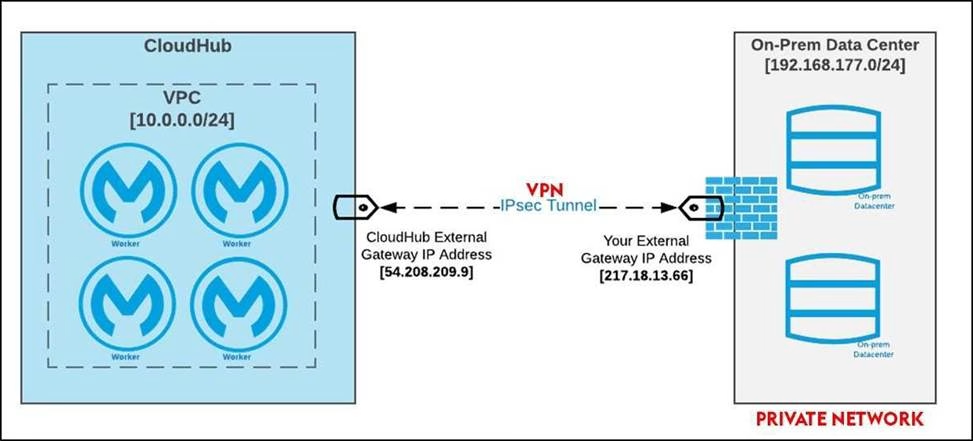What network architecture supports this requirement?
Mule applications need to be deployed to CloudHub so they can access on-premises database systems. These systems store sensitive and hence tightly protected data, so are not accessible over the internet.
What network architecture supports this requirement?
A . An Anypoint VPC connected to the on-premises network using an IPsec tunnel or AWS DirectConnect, plus matching firewall rules in the VPC and on-premises network
B . Static IP addresses for the Mule applications deployed to the CloudHub Shared Worker Cloud, plus
matching firewall rules and IP
whitelisting in the on-premises network
C . An Anypoint VPC with one Dedicated Load Balancer fronting each on-premises database system, plus matching IP whitelisting in the load balancer and firewall rules in the VPC and on-premises network
D . Relocation of the database systems to a DMZ in the on-premises network, with Mule applications deployed to the CloudHub Shared Worker Cloud connecting only to the DMZ
Answer: A
Explanation:
* "Relocation of the database systems to a DMZ in the on-premises network, with Mule applications deployed to the CloudHub Shared Worker Cloud connecting only to the DMZ" is not a feasible option
* "Static IP addresses for the Mule applications deployed to the CloudHub Shared Worker Cloud, plus matching firewall rules and IP whitelisting in the on-premises network" – It is risk for sensitive data. – Even if you whitelist the database IP on your app, your app wont be able to connect to the database so this is also not a feasible option
* "An Anypoint VPC with one Dedicated Load Balancer fronting each on-premises database system, plus matching IP whitelisting in the load balancer and firewall rules in the VPC and on-premises network" Adding one VPC with a DLB for each backend system also makes no sense, is way too much work.
Why would you add a LB for one system.
* Correct answer. "An Anypoint VPC connected to the on-premises network using an IPsec tunnel or AWS DirectConnect, plus matching firewall rules in the VPC and on-premises network"
IPsec Tunnel You can use an IPsec tunnel with network-to-network configuration to connect your on-premises data centers to your Anypoint VPC. An IPsec VPN tunnel is generally the recommended solution for VPC to on-premises connectivity, as it provides a standardized, secure way to connect. This method also integrates well with existing IT infrastructure such as routers and appliances.
Reference: https://docs.mulesoft.com/runtime-manager/vpc-connectivity-methods-concept

Latest MuleSoft Integration Architect I Dumps Valid Version with 244 Q&As
Latest And Valid Q&A | Instant Download | Once Fail, Full Refund

